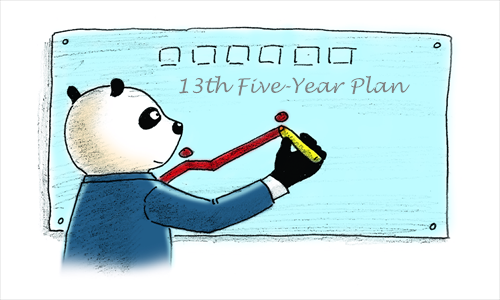
Recently, the
13th Five-Year National Socioeconomic Development Plan released by China has chartered a blueprint for the country's development over the next five years and provides more opportunities for other countries. As this plan is gaining global attention, CRI (China Radio International) Online interviewed Gerhard Stahl, a visiting professor of Peking University HSBC Business School (PHBS) and a China expert at the College of Europe in Bruges, to reveal the plan’s underlying purposes, impact on social development, and implementation challenges.
Once a Secretary General of the European Committee of the Region, he compared China’s 13th Five-Year Plan to the EU 2020 Strategy, saying that China, fundamentally, has the same development goals as the EU. “These goals are quite similar to those of the EU 2020 Strategy, such as stable economic growth, inclusive society, poverty elimination and environmentally-friendly economic models. However, the key is how to implement the 13th Five-Year Plan and whether these development goals will be realized under a sustained, stable and transparent mechanism,” Stahl remarked.
As the Chinese economy has entered “new normal”, a phase different from the high-speed growth pattern in the past, it now features more sustainable, mid-to-high speed growth with higher efficiency and lower costs. Prof. Stahl holds that the 13th Five-Year Plan places emphasis on economic transition instead of hitting numbers, leaving more room for economic restructuring and sustainable growth. “The core of China’s future economic development is not about whether the GDP growth rate will decrease, but whether the economic restructuring will succeed with no structural obstacles or imbalance during China’s shift from export-oriented pattern to service-driven model,” commented Stahl.
When talking about the challenges that economic adjustment may pose, Stahl said it will certainly lead to the collapse of excess-capacity enterprises. The real challenge confronting the Chinese economy is how soon China will reduce excess capacity in the old economic model, and it will find new growth points of the service industry and consumer goods. However, Stahl believes the economic transition mentioned in the 13th Five-Year Plan will help China release more economic vitality to avoid falling into the middle income trap. He said, “The 13th Five-Year Plan advocates entrepreneurship and further integration into the global economy, which means China is ready to adapt to changes so as to cope with pressure from international markets.”
In the 13th Five-Year Plan, the concept “innovation” is put at the core of China’s development. The word “innovation” appears as many as 27 times on the communiqué of the Fifth Plenum of the 18th Central Committee. The Central Committee is a political body that comprises the top leaders of the Communist Party of China. Therefore, how to understand innovation and how to leverage innovation to cope with multiple challenges under the “new normal” has become the focus of the international community. “I think innovation is not just about research and development in high and new technologies, but more refers to the social competence to create a new development model which can adapt to new products and new technologies,” Stahl said. He thinks that China needs to formulate related policies to encourage innovation next, and the implementation of these policies will need not only the improvement of people’s overall educational level, but also changing consumers’ stereotypes. It means that consumers have to change their consumption patterns in line with a more sustainable live-style, for instance, using fewer private cars and more public transport.
Fields:Public and Fiscal Policy, Monetary Policy, Green Economy, Financial Markets and International Economy, Governance and Political Systems, Urban- and Regional Policy
















